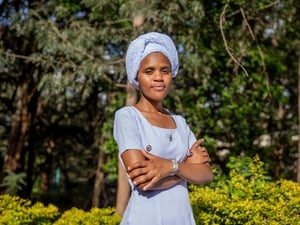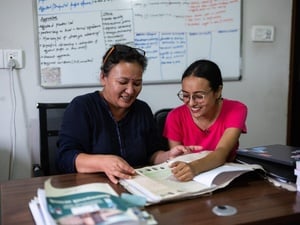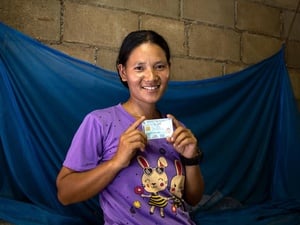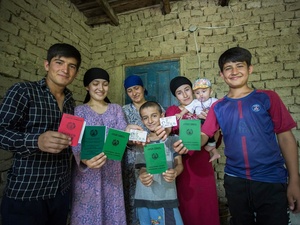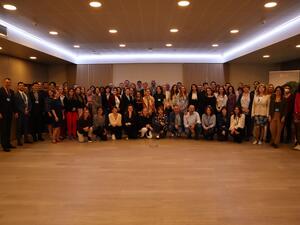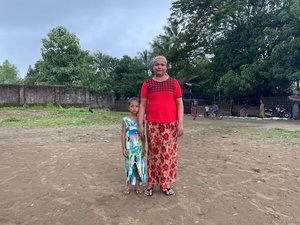Hendricks commends efforts to end statelessness in Côte d'Ivoire
Hendricks commends efforts to end statelessness in Côte d'Ivoire

In western Côte d'Ivoire, Barbara Hendricks distributed birth certificates to children in a move to help reduce the risk of statelessness.
ABIDJAN, Côte d'Ivoire, July 22 (UNHCR) - The UN refugee agency's Honorary Lifetime Goodwill Ambassador Barbara Hendricks recently met with stateless people in Côte d'Ivoire, where she saw first-hand how government efforts are helping to resolve a problem affecting hundreds of thousands of people countrywide.
Hendricks visited the West African country, which has one of the biggest stateless populations on the continent, last month to raise awareness in the lead-up to the mid-September global launch of UNHCR's 10-year campaign to end statelessness.
"A stateless person is someone who is like a ghost - they are invisible to all the things we take for granted," said the Goodwill Ambassador. "Imagine how it feels to not exist in the eyes of the law - to not be able to go to school, take an exam, open a bank account, travel, get married or register your children's birth. All doors are closed and this is deeply frustrating - limiting your life and your family's ability to move forward."
Based on data from the Ivoirian government, UNHCR estimates that 700,000 people are stateless or of undetermined nationality in the country. The high number is due to several factors: After Independence in 1960, changes in the legal code prevented the descendants of immigrants from acquiring Ivoirian citizenship. During the 2002 civil war and the 2010-2011 post-electoral crisis, the destruction of civil registries and the loss of individual documentation made it very difficult for people to prove their citizenship. Abandoned children are not covered by national legislation and therefore do not have Ivoirian citizenship. In addition, tens of thousands of children are at risk of statelessness because they have never been registered at birth and therefore cannot prove their national affiliation.
Antoinette, 35, was born in Bondoukou, close to the Ghanaian border, but migrated to Yopougon in Abidjan to become a trader. Although she has a birth certificate and even an Ivorian national identity (ID) card issued in the 1990s, she was rejected when she applied for the new ID card in 2008. Since then, she must annually obtain an "attestation d'identité", an administrative document issued by local municipalities, which has little real value, and has not been able to prove her citizenship.
When the Goodwill Ambassador asked her what being stateless meant in practical terms, she said, "I cannot open a bank account, I cannot vote, I cannot help my children as much as I would like, I cannot buy land, it's a real nightmare."
Côte d'Ivoire has just begun a new phase of issuing ID cards and it remains to be seen whether Antoinette will be able to prove her nationality.
During her visit to SOS Village, an orphanage in Aboisso about 115 km east of Abidjan, Hendricks spoke with children who received birth certificates with the help of UNHCR and its Government partner, the Ministry of Justice, Human Rights and Public Liberties.
One girl recalled arriving in the orphanage school in July 1997 and feeling powerless and isolated from the rest of society because she did not have a legal identity. "It was a real joy to finally receive my papers; I could not help but be overjoyed," she said.
The students gave themselves impressive pseudonyms like philosopher Denis Diderot and writer Guy de Maupassant. They were full of hope that their documents could help them achieve their ambitions to become lawyers, architects and historians.
On a field trip to Dronguine in western Côte d'Ivoire, Hendricks participated in a ceremony organized by UNHCR and its Government partner, the Service d'Aide et d'Assistance aux Réfugiés et Apatrides, in which children received birth certificates for the first time. These documents confirm their name, place and date of birth, and parentage, and reduce the risk of statelessness.
Elise, a mother of three, told Hendricks, "Having documents for my children gives me great joy. It took us a while to obtain them because of the war. A child without documents is like a child who is not born, does not exist. Now, they have the opportunity to do whatever they want, go to school, work and have a future."
The Government of Côte d'Ivoire has made significant progress in addressing the problem of statelessness. In October 2013 it acceded to the two international conventions relating to statelessness. It is currently leading a registration campaign that allows stateless people who meet specific criteria to acquire Ivoirian citizenship through simple declaration, and will host a Regional Conference on Statelessness in the fall of 2014.
Hendricks' June 24-26 visit concluded with meetings with the country's Minister of Justice, Human Rights and Public Liberties, Gnenema Coulibaly, and Minister of Solidarity, Family, Women and Children, Anne Desiree Ouloto.
Minister Coulibaly emphasized, "The eradication of statelessness is a real priority for the Ivoirian Government. It is an honour for us that Mrs. Barbara Hendricks has lent her image, voice and person to this cause. Every person in Côte d'Ivoire needs and deserves an identity. You can count on the full commitment of the Ivoirian Government to tackle this issue."
Citing it as a good example, Hendricks added, "Côte d'Ivoire is taking positive steps to eradicate statelessness. This comes at a time when UNHCR will be launching a worldwide campaign in September to eradicate statelessness in 10 years and ensure that an estimated 10 million people who are stateless across the globe are given the same rights as the rest of us."
By Nora Sturm in Abidjan, Côte d'Ivoire


